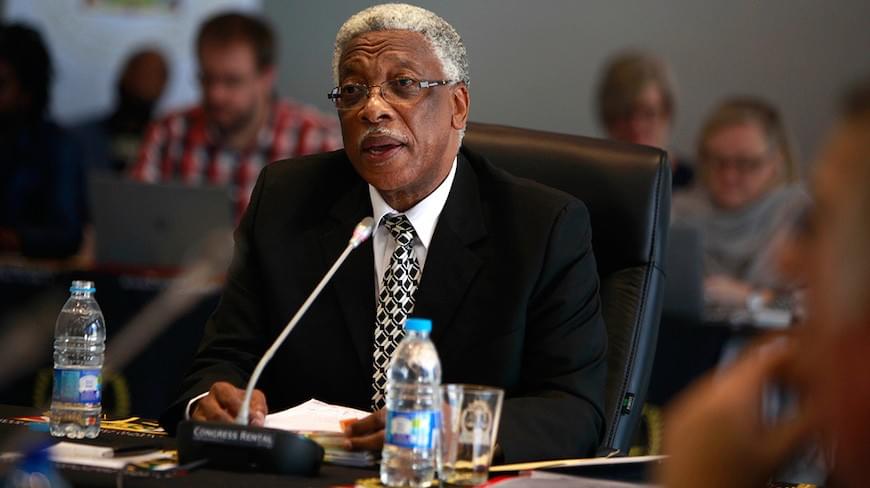
The Judicial Conduct Tribunal into sexual harassment allegations against Judge President Selby Mbenenge, head of the Eastern Cape Division of the High Court, has gripped the nation.
These proceedings, held in Johannesburg, are more than just a legal inquiry—they are a stark reminder of the abuse of power, the pervasive nature of gender-based violence (GBV), and the societal backlash that victims face when seeking justice.
Watching this case unfold, I was deeply moved, angered, and reminded of my own experiences, which I will share in due time. Today, I want to delve into the lessons this case holds for us as a society.
The complainant, Andiswa Mengo, represented by the Women’s Legal Centre and Advocate Bartlett, alleged that the judge sexually harassed her while she worked under his authority. The defendant, represented by Advocate Muzi Sikhakhane, denies the allegations.
From the very beginning, Sikhakhane’s conduct during the proceedings has drawn criticism for its combative tone and dismissive attitude toward the tribunal’s processes. At one point, the Chair of the Tribunal reprimanded Sikhakhane for not adhering to the procedural requirements, emphasizing the need for decorum and respect in such a sensitive matter.
This case marks a historic moment, as it is reportedly the first of its kind in South Africa where sexual harassment allegations against a senior judge are being formally adjudicated.
The dynamics here are painfully familiar: a man in a position of power, a subordinate woman, and a harrowing journey to seek justice. As Andiswa Mengo took the stand, her testimony was both gut-wrenching and courageous. She broke down during cross-examination, and as I watched, I felt the weight of her pain.
Her vulnerability transported me back to my own experience of testifying in a GBV case. Cross-examinations often feel like a battlefield, where victims must relive their trauma while defending their integrity. It’s a process that should seek truth, but too often, it feels like an attack—a secondary victimization.
In this case, the public has exacerbated this harm. Social media and public opinion have subjected Andiswa to backlash, with some questioning her motives and others suggesting she enjoyed the harassment. This rhetoric is not only cruel but deeply ignorant of the reality victims face.
GBV is rampant in South Africa. According to SAPS statistics, over 150 cases of sexual violence are reported daily, but these numbers barely scratch the surface. Many victims remain silent, fearing retaliation, disbelief, or shame. Even among those who report, successful prosecutions are dismally low. A 2022 study revealed that only 8.6% of reported sexual violence cases result in convictions.
When the perpetrator is someone in authority, the stakes are even higher. Victims are often met with disbelief and accusations of ulterior motives. This societal tendency to protect powerful men at the expense of victims perpetuates a cycle of silence and impunity. The backlash against victims who speak out is a form of secondary victimization.
In this case, the public’s response to Andiswa reflects a broader societal issue. Comments suggesting that she enjoyed the harassment or that she is lying only serve to deter other victims from coming forward. It is this toxic culture that allows perpetrators to continue abusing their power without consequence.
This case also highlights the troubling backlash against human rights advocacy. Advocates and organizations standing with victims often face criticism, threats, and discrediting tactics. The Women’s Legal Centre, representing Andiswa Mengo, has faced public scrutiny for supporting a victim against a powerful figure.
This mirrors a larger societal pattern where the fight for justice and human rights is met with resistance from those who benefit from the status quo. The backlash is not just personal—it’s systemic. It seeks to silence voices that challenge power imbalances and demand accountability.
When society fails to support victims, it sends a clear message: power and privilege matter more than justice and human dignity.
Organizations like Judges Matter have emphasized the importance of accountability within the judiciary, highlighting how cases like this erode public confidence in the legal system. They argue that the judiciary must set the highest standard of ethical conduct, as it is the cornerstone of justice.
Judges Matter has called for transparency and a commitment to ensuring that victims of sexual harassment are heard and supported, regardless of the status of the accused.
To combat GBV effectively, we need systemic change. This includes comprehensive education on consent and gender equality, stricter penalties for perpetrators, and reforms in how GBV cases are handled by the police and courts.
But beyond systemic changes, we need a cultural shift. We must create a society where victims feel safe to speak out, where power is not a shield for abusers, and where justice is not a privilege but a right.
To the complainant in this case, Andiswa Mengo and to all survivors of GBV: You are not alone. Your courage to speak out is a beacon of hope for others. The road to justice is fraught with challenges, but your voice matters. It is through stories like yours that we can begin to dismantle the systems that enable abuse and build a society rooted in respect and equality.
As this tribunal continues, let us watch closely. Let us hold Judge Mbenenge and others like him accountable. And let us remember that every step toward justice is a step toward a safer, more equitable world.
Finally, a heartfelt acknowledgment goes to the isiXhosa interpreter for her stellar work throughout these proceedings. Language is a bridge to understanding and justice, and her contribution ensures that Andiswa Mengo’s voice is heard with clarity and respect.
Thank you for your invaluable role in this historic tribunal. I will continue to follow the proceeding with hope for justice for Andiswa and many victims alike.

